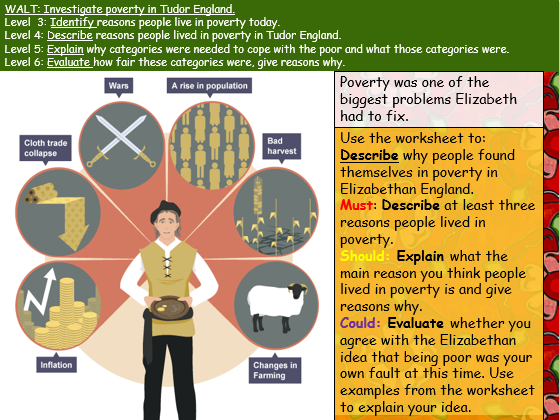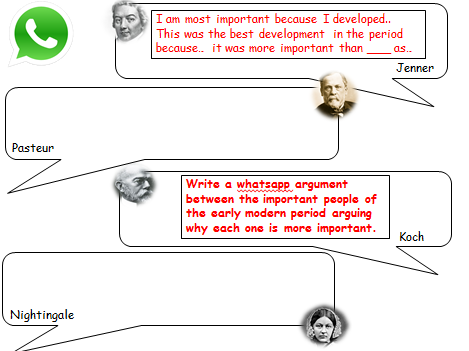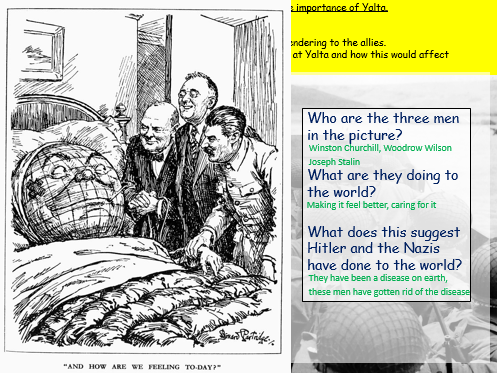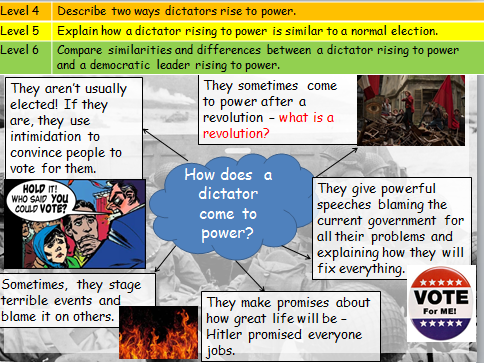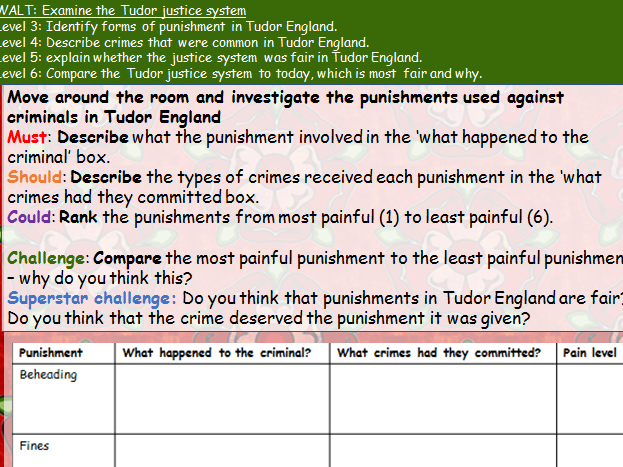
177Uploads
75k+Views
23k+Downloads
All resources

Chronology (What is history? (KS3))
Pupils explore the concept of chronology and how it supports historical learning, they are also introduced to the concept of a turning point and identify turning points in their own lives/across history. Includes a chronological order game of significant events from history.
WALT: define chronological order and apply this skill to historic events.
L3: Define what the term chronological means.
L4: create a timeline of events from history in chronological order.
L5: Explain what a turning point is.
L6: Apply skills to a timeline of my own life and evaluate the biggest turning point in my life so far.

WW1 Medicine Revision Session (Edexcel 9-1)
Session covers the Western Front section of the Edexcel history 9-1 course.
Pupils cover:
features of a trench
features of the main battles
key medical problems
key medical advances
blood transfusions and x-rays (problems and solutions)
following up a source

Anglo-Saxon and Norman England key words (Edexcel 9-1)
two page document with key words for the unit on it - in line with Edexcel 9-1.
I went through the Pearson textbook and included all of the key words from front to back of the textbook.

Weimar and Nazi Germany key words (Edexcel 9-1)
Three page document of key words for the Weimar and Nazi Germany unit.
I used the Hodder textbook and went through cover to cover to produce a document of all key words to support pupils with the content prior to examination.

Ice Mummy Interpretation Skills Lesson (What is history? (KS3))
This lesson follows a pupil led investigation in which they discover what has happened to the ice mummies - this lesson builds upon this knowledge and develops skills of working with interpretations prior to baseline assessment - this lesson is part of a series of lessons that build upon use of sources, interpretations and finally a baseline assessment. These can be found separately or as part of a bundle in my tes shop.
WALT: apply knowledge of the Ice Maiden to interpretations about what happened to her.
L3: Recall key facts about the Ice Maiden.
L4: Describe what an interpretation is and how a historian creates it.
L5: Create an interpretation about what happened to the Ice Mummy.
L5-6: Analyse interpretations that we will use in our assessment to plan why we agree and disagree with them.

REVISION Hitler's Rise to Power (Edexcel 9-1: Weimar and Nazi Germany)
This lesson is set to help pupils revise content surrounding Hitler’s rise to power in preparation for Paper 3 of the new edexcel specification (2016).
Pupils will:
Describe the Reichstag Fire
Analyse the reasons he rose to power - differentiated
Plan and answer (if time) a 20 mark interpretation question
Analyse how useful a source is

PSHCE British Values
PSHCE lesson that explores the Ofsted framework for British Values. Taught to year seven, fully differentiated with gap fills and challenge tasks.
Pupils create a poster at the end to be displayed in tutor rooms so that you can show that they understand what BV are.

Elizabethan England: Poverty and the Poor Laws
WALT: Investigate poverty in Tudor England.
Level 3: Identify reasons people live in poverty today.
Level 4: Describe reasons people lived in poverty in Tudor England.
Level 5: Explain why categories were needed to cope with the poor and what those categories were.
Level 6: Evaluate how fair these categories were, give reasons why.

'What is history?' introductory lesson (What is History? (KS3))
The first lesson in a scheme of work designed to introduce KS3 pupils to the concept of history and help them acquire historical skills.
WALT: identify key historical skills and explain why history is important.
L3: Define what the study of history is.
L4: Describe key skills a good historian needs.
L5: Explain why history is important.
L6: compare history to another subject and justify which you think is most important.
Pupils define what history is in their own words.
Investigation of blooms words, describe, explain, infer etc.
Discussion of what history is, prior learning and a video.
Lesson includes homework for pupils to complete, teacher can use homework to gain a baseline of pupils ability.

The Rising Against Tostig Godwinson (Anglo-Saxon and Norman England (Edexcel 9-1))
WALT: Evaluate the reasons and response to the rebellion against Tostig.
2-3: Recall key facts about the role of an earl.
4-5: Describe reasons Saxons did not like Tostig.
6-7: Explain why factors would make somebody rebel.
8-9*: evaluate whether Harold was right to exile his brother.
Pupils will recall the roles of an earl for the starter.
They will then go through each of the reasons the Saxons hated Tostig (printable handout that pupils highlight and annotate)
They write a letter to Harold (LA) or a response from Harold (HA) explaining why they are upset/ how they are going to offer help
They analyse the impact this had upon Harold’s claim and whether he was right to exile his brother.

Modern Medicine Revision (Edexcel 9-1)
Session covers:
new technology, lung cancer, magic bullets, penicillin and the creation of the NHS
Pupils complete a worksheet whilst teacher leads the session

Police State (Weimar and Nazi Germany: Edexcel 9-1)
WALT: Explain how the creation of a police state changed things in Germany.
Identify the features of a police state.
Describe how one aspect of the police state worked.
Explain the role played by the Gestapo in keeping control.
Evaluate Hitler and the Nazi Party’s use of the police state.
starter: key words activity
Task one: infer two things from a source, including full mark answer so that pupils can self assess and improve their work.
task two: video activity demonstrating how the police state functions
task three: as seen on cover photo, pupils describe the key branches of the police state and explain how it helped Hitler keep control of Germany.
task four: pupils examine four sources and apply criteria to explain which they feel is most useful for the enquiry (skills building).

Medieval Medicine Revision (Edexcel 9-1)
Session designed to last one hour and includes everything for medicine 1250-1500 cross referenced with the first chapter of the Pearson textbook.
Included is a worksheet for pupils to complete alongside the session.
Pupils cover:
causes of disease image starter
key words
theory of the four humours
miasma theory
different people that could treat you
treating the sick
hospitals
the Black Death 1348-1349

Early Modern Medicine (1700-1900) Revision Session
This session covers
Jenner, Pasteur, Koch, Nightingale, Cholera (Chadwick and Snow) And the Public Health Acts.

KS3 Hitler's Downfall (WW2)
This lesson covers:
The Battle for Berlin
Hitler’s suicide
Yalta Conference
Pupils will:
WALT: Explain why the Nazi’s surrendered to the Allies and the importance of Yalta.
Level 3: Identify what position Germany was in by 1945.
Level 4: Describe the key events of the Battle for Berlin.
Level 5: Explain how the Battle for Berlin lead to Germany surrendering to the allies.
Level 6: Compare sources to analyse what the Big Three wanted at Yalta and how this would affect Germany.

WW2 Dictators
A whole lesson with worksheets and fully differentiated that compares Tojo, Hitler and Stalin.
Pupils identify what a dictator is and who the three men are
They describe/explain how a dictator is able to rise to power
Compare similarities and differences between the three men
Evaluate who changed the most things in their country and why we remember their atrocities rather than the positive changes they made to their countries.
I use this as an introduction to a unit on WW2 to provide pupils with some context into the political landscape of the world prior to the start of the war.

KS3 Invasion of Poland (WW2) Narrative account lesson
Pupils will explore the invasion of Poland with the aim of creating a GCSE style narrative account in preparation for the skills needed at KS4.
Pupils will:
examine the Munich Agreement and hypothesise how peopl e would react to it
Watch a video of the invasion and collect notes to be able to describe the invasion
Put the events of the invasion into chronological order using visual prompts for support
create a narrative account using a GCSE support sheet that allows development towards explaining why events lead to one another and cause change.

Tudor Crime and Punishment
This is a lesson aimed at KS3, it provides an overview of crime and punishment in Tudor times.
Pupils complete a carousel around the room in order to analyse the punishments that people received for certain crimes.
They then decide which punishments the criminals deserve (Anne Boleyn and Thomas Cromwell included) before comparing whether the Tudor justice system is fair with today’s justice system.

Trench Medicine WW1
Pupils explore the problems soldiers, nurses and doctors faced as well as analysing the advances in medicine that helped soldiers overcome problems like trench fever, shell shock and shrapnel wounds.
Pupils analyse sources before completing a carousel and then making a leaflet advising a soldier about how best to protect themselves on the western front.

Elizabethan England: Who was Elizabeth I?
Introductory lesson aimed at KS3 that builds GCSE skills of describe two features and how useful.
Lesson is fully differentiated with worksheets within the powerpoint as hidden slides.
Pupils green pen exam responses to develop understanding of what good writing looks like, pupils are given the opportunity to work up to a level 6 and all tasks are signposted and fully differentiated to support pupils to make good progress.
Task one: Describe what England was like in 1588 (describe two features exam question)
Task two: Explain why people would like/dislike Elizabeth
Task three: How useful are portraits of Elizabeth to a historian?








